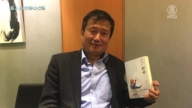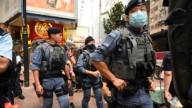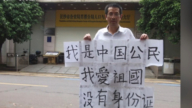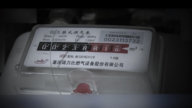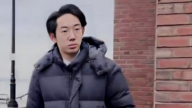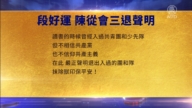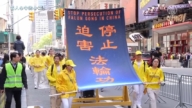【新唐人2014年02月05日訊】中國的國家機密無所不在,長期受到詬病,不少人因為所謂「泄露國家秘密罪」被送入監獄。日前,中共公布《保守國家秘密法實施條例》,要求官員不要再隨意以模糊的「國家秘密」為藉口,拒絕對外披露公眾知情權中應該知道的信息。但是條例並沒有說明哪些信息是可公開或不可公開。換句話說,保密事項範圍,根據情況可及時調整。
中共公布最新《保守國家秘密法實施條例》,由中共國務院發佈,中共總理李克強簽署,預計3月1號起施行。
這項條例的總則規定,機關、單位不得將依法應當公開的事項,確定為國家秘密﹔並且不得將涉及國家秘密的信息公開。然而這份條例並沒有說清楚,甚麼信息可以公開,甚麼樣的信息又需要保密。
根據英國《路透社》報導,中國的「國家秘密法」非常模糊不清,它涵蓋的內容,從每年被處決的犯人人數,到工業統計數據,甚至是污染數據,以及任何可追溯定義為國家機密的信息。
事實上,中共當局濫用所謂的「國家秘密罪」非法抓捕關押了不少人,上海律師鄭恩寵就是其中一位。
鄭恩寵曾代理上海的一些拆遷糾紛案件,並向中國上級政府告發上海高層的一些貪污案件,涉及的政商要人包括周正毅、黃菊、陳良宇、韓正等人。他在辦案過程中收集整理的證據,成了當局定他洩密罪的證據。2003年10月,鄭恩寵被當局以「向境外非法提供國家秘密罪」判刑3年。
上海律師鄭恩寵:「中國到處都是國家保密法,政府任何一個醜聞都是國家秘密,所以說,我認為這個沒有任何(幫助),這反而起到一種保護體制腐敗的(作用)。」
鄭恩寵表示,根據新的條例,各地方政府、或各個部門,會更加詳細的把自己所有不宜公開的事情,都認為是國家秘密。這樣使老百姓更無法參與國家事務,沒法推動社會的進步,和參與政府的反腐,那麼腐敗將越來越多。
鄭恩寵還表示,中共的《憲法》裡,老百姓有知情權和結社與言論的自由。但是,言論自由是建立在國家秘密很少的基礎上。他認為,甚麼都是國家秘密,保護的則是體制上的腐敗。
鄭恩寵:「國務院這個條例行政法規,他還不能完全執行的,還要到各省市的人大,通過地方法規,還有細則的,所以這麼下來,我認為它沒有任何的進步。」
《保守國家秘密法實施條例》總則規定,國家保密行政管理部門主管全國的保密工作。縣級以上地方各級保密行政管理部門,在上級保密行政管理部門指導下,主管本行政區域的保密工作。
北京維權人士胡佳:「即使有了實施細則,那真正在執法過程中,許多可操作的空間,上有政策下有對策,這是我們中國各級地方政府是最為擅長的,所以你想拿這些去制約他很困難,就像憲法中寫的公民35條款,公民權利條款有幾時落實過,我覺得到後邊的話,仍然會有很多公民因為涉及所謂國家機密這些方面,受到當局的報復,不會產生根本性的改善。」
北京維權人士胡佳,在奧運會前夕,因轉發一份公安局在網路公開的文件,而被抓捕。
胡佳:「在我2008年被捕,就是被控煽動顛覆國家政權罪的時候,他們在幾個月的時間內,阻撓我會見律師,他們當時的理由就是說我的案件涉及國家機密。」
大陸記者師濤去年9月獲釋。他因全球互聯網入門網站「雅虎」公司,向中共當局洩露用戶電郵內容,而遭當局以「為境外非法提供國家秘密罪」判刑10年。而以同樣罪名被中共關入監獄的還有﹕前香港《文匯報》駐大連記者姜維平,和現居美國的香港學者徐澤榮等人。
最新的國家機密條例還警告中共官員,不僅需要將公共信息公開,還要對國家秘密保密。而對於那些向公眾泄露過多信息的人員,將依法給予處分。
那麼到底哪些信息才屬於中國的「國家機密」呢?恐怕除了百姓和記者以外,中共官員也莫衷一是﹗
採訪/常春 編輯/黃億美 後製/郭敬
Latest Catch-All, State Secrets Laws – It’s All Over!!!
The long criticized state secrets exist everywhere in China.
Many Chinese have been jailed for divulging state secrets.
Recently, China has issued new rules telling officials not to
cover up what should be publicly available information using
the excuse it is a state secret.
However, they do not specify what’s public and what’s not.
In other words, the scope of the confidentiality is up to the
situation. How long is a piece of string?
The latest state secrets laws were signed by Communist Premier
Li Keqiang and issued by the State Council, effective March 1.
The regulation said, Organs and units have been told not to
label items that should be made public as state secrets,
and they should not publicize those related to state secrets.
However, the regulations remain vague as for what information
is public and what is considered secret.
Reuters reported, “China has notoriously vague state secret laws,
covering everything from the number of people executed every
year to industry databases and even pollution figures,
and information can be retroactively labeled a state secret."
In fact, the Marxists authorities have abused so-called
state secrets to illegally arrest and detain Chinese,
such as Shanghai lawyer Zheng Enchong.
Representative for the forced demolition dispute, Zheng Enchong
had complained to high officials about corrupt cases involving
both officials and businessmen in Shanghai,
such as Zhou Zhengyi, Huang Ju, Chen Liangyu, and Han Zheng.
The evidence he had collected turned out to be the stick
used to convict him of the crime of divulging state secrets.
Zheng Enchong was sentenced to three years in prison
in Oct. 2003.
Zheng Enchong, Shanghai lawyer: “There are state secrets
everywhere in China.
Any government scandals are state secrets.
I don’t think the new rules would help,
but rather a protection of the corrupt system."
Zheng Enchong says that under the new regulations,
local governments and units will further censor what they
believe inappropriate to disclose as state secrets.
The public will further be excluded from state affairs,
social activities, and anti-corruption campaigns.
The corruption will only get more serious.
Zheng Enchong also says that the regime’s Constitution
provides the rights to know, to assemble, and to express.
However, free expression is built upon minimal state secrets.
He believes that with the widening of state secrets,
the new rules only protect the corruption of the system.
Zheng Enchong: “Before the implementation of the State
Council’s regulations,
it will go through people’s congresses of provinces and cities
and local governments.
After it’s gone through the cycle, minimal improvements
are made."
The state secret laws regulate, the State Administrative
Department takes charge of national secrecy.
Under the guidance of the higher level administrative department,
local administrative department takes charge of the local secrecy.
Hu Jia, Beijing activist: “Even with detailed rules, there will
be operational space during the law enforcement, i.e.,
measures against the rules.
That’s what the local governments are good at, and why it’s
hard to control the local governments.
There are civil rights provisions in the Constitution, however,
they’ve never been implemented.
I believe many citizens will continue to be abused by the
authorities on the excuse of divulging state secrets.
There will be no fundamental improvement."
Beijing activist Hu Jia was arrested on the eve of the Olympics
for forwarding an online document of the Public Security Bureau.
Hu Jia: “I was arrested in 2008, accused of inciting subversion
of state power.
I was deprived of meeting with my attorney for months.
Their excuses were that my case involved state secrets."
Journalist Shi Tao was released last September.
He received 10 years jail time for releasing a document of
the Communist Party to an overseas Chinese democracy site.
The regime charged him based on the email record confirmed
by Yahoo!China.
Imprisoned on the same charges are also Jiang Weiping,
former Hong Kong journalist in Dalian,
and Xu Zerong, a Hong Kong scholar.
The latest state secrets laws also warn officials not to
disclose state secrets.
Those who divulge too much information to the public will be
punished according to law.
Exactly what information is state secret?
The consensus is probably hard to reach,
be it for the general public or the officials.
Interview/ChangChun Edit/HuangYimei Post-Production/GuoJing


